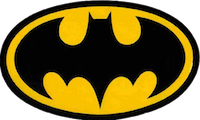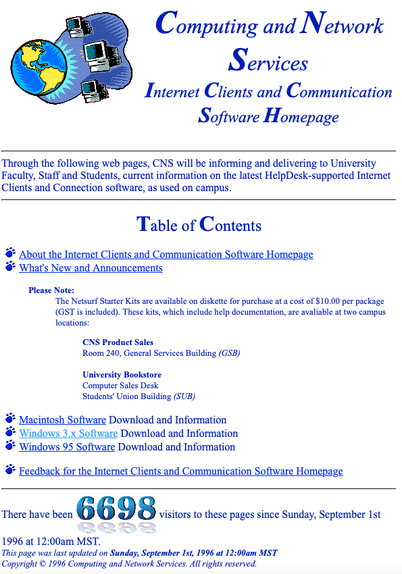Recent searches
Search options
#worldwideweb
If more people had some good sense, they would use country extension domain names.
But everyone wants that cool domain, for example, random dot social, as opposed to random dot ch.
Corporate America, governed under Us Law, is going to have a lot more oversight on the Internet, and many of you are not paying attention.
#Internet #WorldWideWeb #Oversight #DomainName #Domain #DomainRegistration #Register #Website
back in the early and mid-90s, getting on the net meant you were a university student, or had corporate access through a big company. getting online wasn't easy.
worse, even if you had a dialup number and login, there was no such thing as a tcp/ip stack built-in to Windows 3.1.
even if you *did* have a winsock stack, you'd still need a file downloading protocol, gopher client, world wide web client, ftp client, email client. just getting your machine off the ground was nearly impossible unless you could grab these from a local BBS
to make things simpler, universities began offering dial-up internet software packages to their students and staff.
in 1994, my mom was an undergrad student at the University of Alberta. our family had just bought an IBM PS/1 with a 2400 baud modem, and i was abusing the hell out of our single phone line at night visiting local BBSes.
she somehow found out that the university was selling internet dial-up software for $10 to students, and brought home the diskette pack with her. along with a USR Sportster 14.4k modem, she gave me the install diskettes as a valentine's day gift.
it had a slick setup program that enabled SLIP using Trumpet Winsock, and provided a local (free!) dial-up number for access.
after 25 years, i finally tracked down a few versions of those diskettes. i've imaged them and uploaded them all to IA.
the first version of the dial-up package in 1994 was called WinSLIP. it had no PPP support yet, but contained some really cool shareware internet utilities like HGopher and NCSA Mosaic. this would have been the earliest programs offered for Windows 3.1
WinSLIP/MSKermit 1994/95:
https://archive.org/details/ua_winslip
The second version of the software was renamed to NetSurf. It stripped out most of the obscure shareware sadly, and replaced them with Netscape 2 and Eudora Light. The new version of Trumpet Winsock offered PPP which was a huge improvement:
NetSurf 1996/97:
https://archive.org/details/ua_netsurf_96
Now well into the Windows 95 era, the 1997/98 software was shipped on a CD with a hilarious "multimedia" installer/help program designed in Macromedia Director:
NetSurf 1997/98:
https://archive.org/details/netsurf-97-starter-kit
I hope this brings back some memories for fellow U of A alumni :)
. Welcome to the Internet
Have a look around.
Yes, back before search engines, truly took off, there was indeed a "Yellow Pages" (phone book) for the Internet.
#Internet #WorldWideWeb #Welcome
I got nostalgic, so I ended up browsing pictures from #DWebCamp2023, and I found these wild shots of me and @timbl. Almost two years have passed, and I still cannot completely believe that I spent time chatting with the creator of the #WorldWideWeb and that he autographed my thesis [tommi.space]!
Unbelievable things happen at #DWebCamp.
(Thanks to @mai for the stolen shot )
Fun fact: @mark kindly came and picked me up at the airport and he drove me and TBL to DWeb Camp. The first thing they asked me about while getting to the car was this patch I had, simulating the hammer and sickle communist symbol, but actually representing a sickle popping open an Aperol Spritz. So there was me, super jet-lagged and hungover (because I had my last exam of my bachelor the day before) trying to explain what that was to the creator of #HTML and the director of the #WaybackMachine. It was super embarrassing but it is a great story to tell.
@dweb #TBL #WWW #Internet #InternetHistory #decentralization #HTTP #Web
nothing felt more exotic than seeing ozemail.com.au domains join my irc channels in 1995
diskette image:
https://archive.org/details/15-ozemail-internet-starter-kit-v-2-orig
 @reiver@mastodon.social
@reiver@mastodon.socialFrom the year 2001:
I remember when web-sites like this were considered very, very, sleek, new, and fancy.
And, compared to what web-sites tended to look like in the 1990s, they were!
@cybercultural [indieweb.social] @ricmac
RE: https://indieweb.social/@cybercultural/113989953061003587
got robots.txt ?
Dark Visitors - list of known AI (and other) agents on the internet : ‘the hidden ecosystem of autonomous chatbots and data scrapers’ https://darkvisitors.com/ #DarkVisitors #WebCrawlers #WorldWideWeb
in february 2000, Be announced it was releasing its BeOS operating system for free.
here is the website around the free launch. i sure do miss that swoopy web design aesthetic with handcrafted nav icons and lighting effects.
https://web.archive.org/web/20000815093906/http://www.be.com/products/freebeos/beosspecs.html
friendly request for fellow software preservationists:
i've been looking for a particular Win95-based program that was in use roughly from 1997-2000 called Peck's Power Post. it was a usenet binary posting program that was incredibly popular on binary groups in the late 90s, before it was replaced by Power Post 2000.
I know that the filename was PPP06B.ZIP and/or PPP06BF.ZIP
unfortunately, WBM didn't keep a proper archive of the file. the snapshot of http://www.visi.com/~loganx/PPP06b.zip appears to be corrupted, only downloading a 1MB file.
the file is approximately 4MB total.
discmaster and WBM have been searched exhaustively for this file with no luck. if you happen to know of another source for this very obscure program, i'd be indebted.
I'm getting close to being done with the #WWW. It's a flood of #bigotry, #advertising, and #spam owned by #billionaire assholes. I've had enough. The #worldwideweb wasn't supposed to be like this. We should be looking for and using un-exploitable alternatives, like #gemini_protocol. With the big surge of #fediverse platforms like #Mastodon, I'm surprised there wasn't more talk about it. Anyway, yeah. The Web blows.
 @reiver@mastodon.social
@reiver@mastodon.socialWhen peers, audiences, and customers moved off of the decentralized open Internet onto centralized platforms — in practice, it changed the nature of the Internet & Web from permissionless to permissioned.
The #WorldWideWeb got started simply, as a bunch of altruistic academics wanting to spread information as widely and as freely as possible.
From that beginning, it steadily grew in popularity. Eventually, Money figured they could make a buck off of it. Some of our biggest corporations now wouldn't have been possible without the Web.
Now, those corporations are the source of many of the Web's biggest problems, and the best parts of it (like Wikipedia) are those that never lost sight of its foundation: distributing information wide and free.
The Web hasn't become ruined. People have just lost sight of its basis. You don't have to have a lot of money to play around on the internet, to make things for others there. it's how it started, and it's its salvation too.
i've noticed in recent years that the laudable return to personal homepages has generally brought with it a very specific re-imagining of 1990s web design - usually lo-fi 1994 html-only and neon cyberpunkish affairs with loud animated gifs.
lost in that specific imaginary are 1996-1997 corporate designs that brought a slightly more conservative aesthetic that nonetheless remained playful.
if you played Inherit the Earth: Quest for the Orb, Dinotopia, or Faery Tale Adventure 2 you would remember The Dreamers Guild. this is their corporate site still live and maintained by joe pearce and brad schenck.
Okay... it seems Sir Tim Berners-Lee, the creator of the World Wide Web, has just joined the Fediverse at:
(For those wondering about verification, this is genuine as far as I can tell. The account is on the w3c server and they only allow manually verified signups, plus the verified account of the w3c is following him.)
Thank you to @vmstan for the headsup about this!
thanks to @MossRC’s exceptional book Shareware Heroes, TIL that TUCOWS stood for The Ultimate Collection of Winsock Software.












